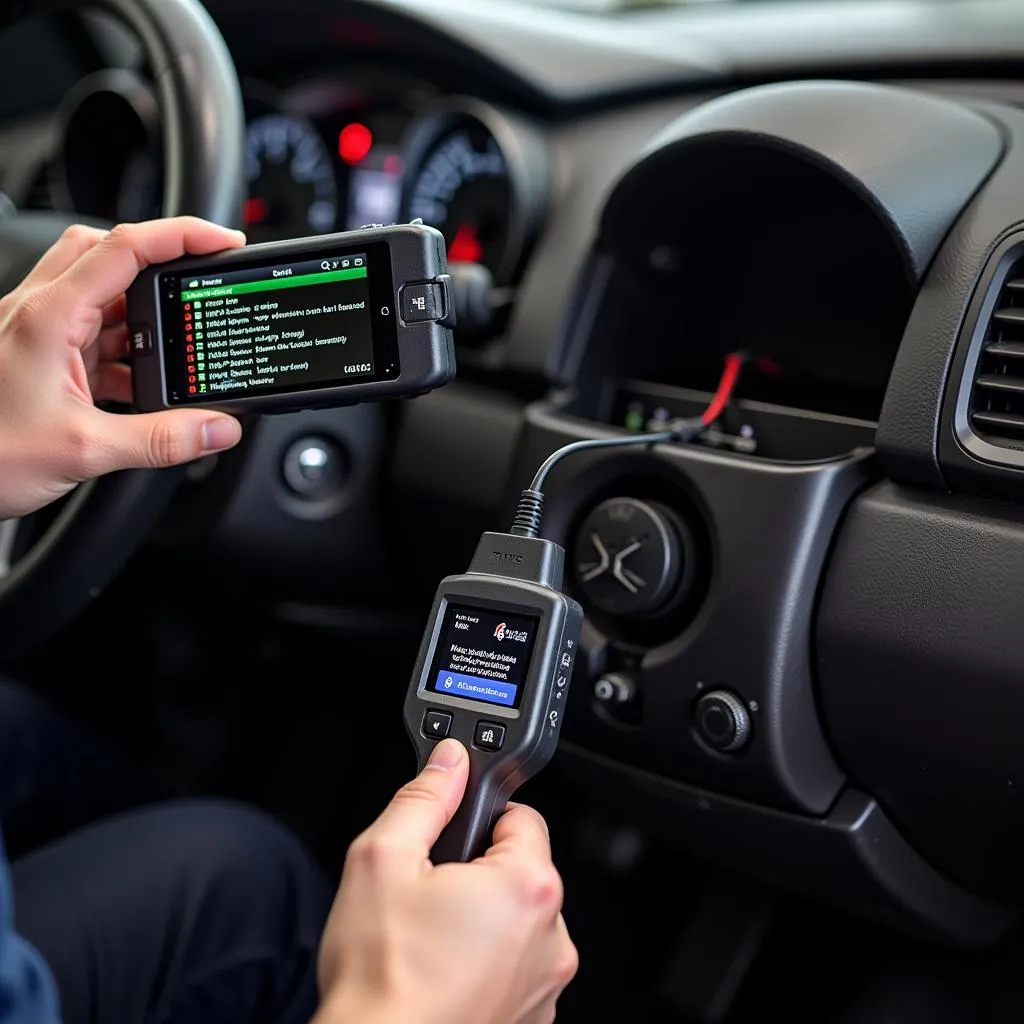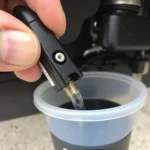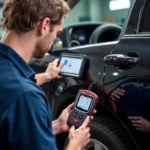A diagnostic scanner is an essential tool for any mechanic, car enthusiast, or vehicle owner who wants to understand their vehicle’s health and performance. This powerful device allows you to communicate with your car’s computer system, accessing a wealth of information about its current condition and past performance.
Understanding Diagnostic Scanners: How Do They Work?
Modern vehicles are equipped with sophisticated computer systems that monitor and control various aspects of their operation. These systems generate data about engine performance, emissions, transmission, and other critical components. A diagnostic scanner acts as a bridge between your vehicle’s computer and you, allowing you to access this data.
By connecting to the vehicle’s OBD-II port, typically located under the dashboard, the obd2 bluetooth diagnostic scanner retrieves Diagnostic Trouble Codes (DTCs). These codes represent specific issues or malfunctions detected by the vehicle’s computer. Using a diagnostic scanner, you can read and interpret these codes, gaining valuable insights into the root cause of various problems.
Why is a Diagnostic Scanner Important?
Early Detection and Prevention: Diagnostic scanners can identify potential issues before they become major problems. By detecting issues early, you can address them promptly, saving on costly repairs down the road.
Accurate Diagnosis: Guesswork can be expensive and time-consuming when it comes to car repairs. A vehicle diagnostic scanner provides accurate information, helping you pinpoint the exact cause of a problem and avoid unnecessary repairs.
DIY Repairs: For the mechanically inclined, a diagnostic scanner empowers you to tackle basic repairs and maintenance tasks yourself. You can clear codes, reset warning lights, and perform simple diagnostics, reducing your reliance on mechanics.
Improved Fuel Efficiency: Some diagnostic scanners provide data on fuel economy and driving habits. By monitoring this information, you can adjust your driving style and maintenance practices to optimize fuel efficiency.
Enhanced Vehicle Performance: By monitoring various parameters, diagnostic scanners can help you identify areas where performance can be improved. You can track sensor data, engine performance, and other metrics to ensure your vehicle is running at its best.
Types of Diagnostic Scanners
Basic Code Readers: These entry-level scanners are designed to read and clear DTCs. They are affordable and suitable for basic troubleshooting.
Handheld Scanners: These versatile scanners offer a wider range of features, including live data streaming, sensor readings, and advanced diagnostic capabilities.
Professional-Grade Scanners: Used by mechanics and dealerships, these scanners provide comprehensive diagnostic functionality, access to manufacturer-specific codes, and advanced programming options.
Choosing the Right Diagnostic Scanner
When selecting a diagnostic scanner, consider your needs and budget. Basic code readers are sufficient for simple tasks, while professional-grade scanners are ideal for advanced users.
“Investing in the right diagnostic scanner is crucial for any automotive professional. It’s like having a direct line of communication with the vehicle’s brain, allowing for precise diagnosis and efficient repairs,” says John Smith, a seasoned automotive technician with over 20 years of experience.
Features to Consider
Code Coverage: Ensure the scanner supports your vehicle’s make and model and provides comprehensive code coverage for various systems.
Live Data Streaming: This feature allows you to view real-time data from various sensors, providing insights into the vehicle’s current operation.
Bi-Directional Control: Some scanners allow you to control certain vehicle components, such as activating solenoids or injectors, for testing purposes.
Data Logging: The ability to log data over time can be helpful for identifying intermittent problems or tracking performance trends.
Conclusion
A diagnostic scanner is an invaluable tool for anyone who wants to understand, maintain, and repair their vehicle. By providing access to critical data and diagnostic information, these devices empower you to take control of your car’s health and ensure optimal performance. Whether you’re a DIY enthusiast or a professional mechanic, a launch diagnostic scanner can help you save time, money, and headaches in the long run.
FAQs
1. What is the best-selling automotive diagnostic scanner?
The best-selling automotive diagnostic scanner varies depending on user needs and budget. However, some popular options offer a balance of features and affordability. Check out our article on what is the best selling automotive diagnostic scanner for detailed recommendations.
2. What does a diagnostic scanner connect to?
A diagnostic scanner connects to the vehicle’s OBD-II port, typically located under the dashboard on the driver’s side. It allows access to the vehicle’s computer system for diagnostic purposes. To learn more about the connection and its functionality, you can read our article on what does a diagnostic scanner connect to.
3. Can I use a diagnostic scanner on any car?
Most modern vehicles (1996 and newer) are equipped with an OBD-II port, making them compatible with most diagnostic scanners. However, it’s always best to check the scanner’s compatibility with your specific make and model.
4. Are diagnostic scanners difficult to use?
Basic code readers are very easy to use, while more advanced scanners may have a steeper learning curve. Many scanners come with user manuals and online resources to guide you.
5. Can a diagnostic scanner fix my car?
A diagnostic scanner does not fix your car. It’s a diagnostic tool that helps you identify problems. You’ll still need to perform the necessary repairs based on the information provided by the scanner.
6. How much does a diagnostic scanner cost?
The price of a diagnostic scanner varies widely, from affordable code readers under $50 to professional-grade scanners costing thousands of dollars. Consider your needs and budget when choosing a scanner.
7. Where can I buy a diagnostic scanner?
Diagnostic scanners are available from various retailers, including auto parts stores, online retailers, and specialty automotive tool suppliers.
Need further assistance? Reach out to us via WhatsApp: +1(641)206-8880, Email: cardiagtechworkshop@gmail.com or visit us at 276 Reock St, City of Orange, NJ 07050, United States. Our 24/7 customer support team is ready to help. You can also check out our other articles on related topics such as OBD2 Bluetooth diagnostic scanner and Launch diagnostic scanner.



